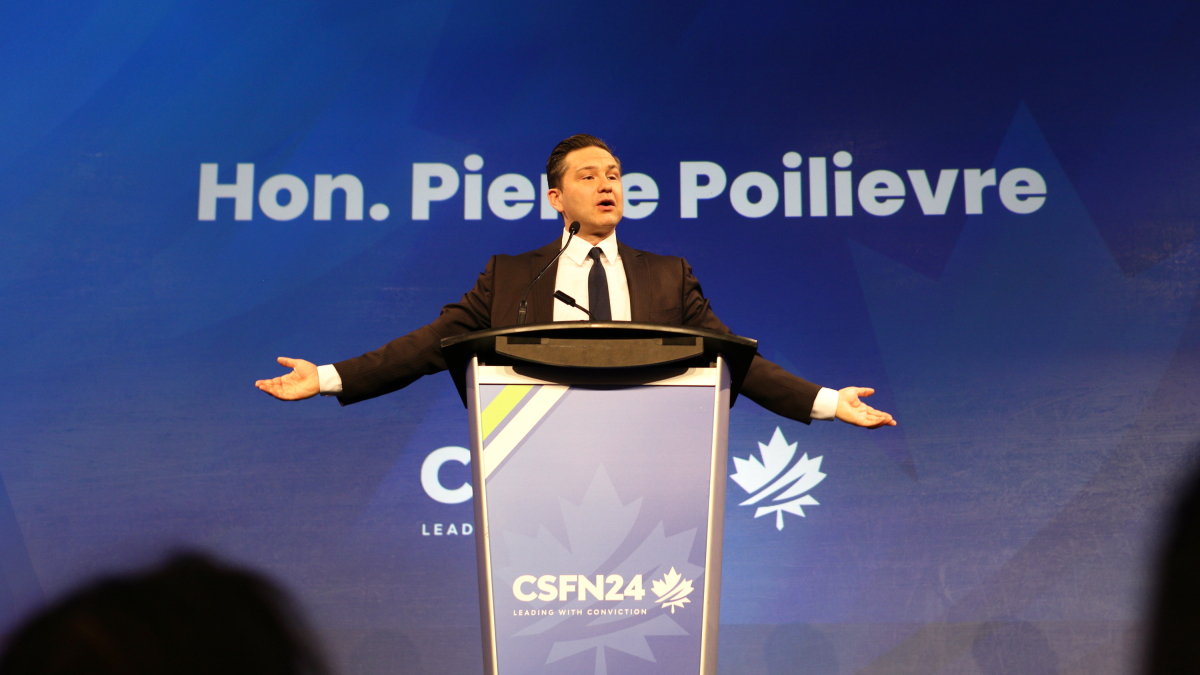Support strong Canadian climate journalism for 2025
In a recent campaign-style video announcing he was pulling out of the supply-and-confidence agreement, NDP leader Jagmeet Singh engaged in some all-too-familiar political rhetoric.
While failing to cite specific policy differences with Justin Trudeau's government, Singh said, “the Liberals govern in the interests of the wealthy and will always cave to corporate greed.”
In Singh's words: Trudeau’s Liberals are "beholden to corporate interests.”
It’s a bizarre message for the federal NDP to champion coming off the heels of supporting this government through a formal governing arrangement over the past two-and-a-half years.
But the NDP leader reserved his harshest words for Pierre Poilievre’s Conservatives. Singh said they would make deep cuts in government that will hurt workers, retirees, young people, patients and families “in order to give more to big corporations and wealthy CEOs.”
Beyond the blatant rhetoric steeped in Singh’s comments, the NDP leader’s stinging message underlines a new ominous reality in Canadian politics: the sharp rise of class-based politics.
And it isn’t merely New Democrats, traditionally ardent defenders of the labour movement, seeking to use class, corporate wealth and “elites” as a wedge to wage political warfare as a federal election looms.
Six months after winning his party’s leadership on a piercing populist message, Poilievre gave a seminal speech at the Canada Strong and Free Network Conference. In his remarks, the Conservative leader accused Trudeau of sowing division, pitting one group against another. Yet for most of his speech, Poilievre did just this, railing against elites — academics, legacy media journalists, corporate executives and well-educated professionals - blaming them for Canada’s ills.
Instead, the Conservative leader praised the “common man and woman”: the electrician, caregiver, bricklayer and carpenter, suggesting they’re “the people who make Canada run.”
The Conservative leader also admonished “powerful drug companies,” referring to pharmacare executives as “corporate dirtbags” for what he claimed was their complicity in worsening the drug overdose crisis in Canada.
The speech was one of Poilievre’s first as leader and made it abundantly clear he would present himself as a champion of working-class people. More menacing, this major speech signaled that Poilievre would use class and socioeconomic status as political wedges: a clear departure from past Conservative leaders.
A year later, Poilievre published an opinion piece in the National Post calling on corporate Canada to fire its lobbyists, describing them as "useless and overpaid." The op-ed turned heads in political Ottawa, particularly among the powerful Conservative lobbyist class that emerged from the Harper government a decade ago.
Poilievre’s full-frontal assault against lobbyists was seen as hypocritical in light of CBC News reporting that uncovered the lifelong politician had headlined 50 fundraisers at private venues since becoming Conservative leader in 2022: some of them in Canada's wealthiest neighbourhoods and most exclusive clubs.
Meanwhile, Trudeau’s Liberals have increasingly resorted to policies and messaging aimed at taking on corporate Canada and the entrepreneurial class. A 2021 Liberal campaign pledge to raise taxes on big banks and insurers caught the country’s executives by surprise, leading many to conclude the party had become hostile to the business community and its contributions to the national economy.
Announcing the government's changes to the capital gains inclusion rate last spring, Finance Minister Chrystia Freeland made a mystifying case for the merits of the Liberals’ contentious tax reforms:
Speaking to reporters, Freeland said the richest Canadians should ask themselves whether they "want to live in a country where those at the very top live lives of luxury, but must do so in gated communities behind ever higher fences using private health care and airplanes because the public sphere is so degraded and the wrath of the vast majority of their less-privileged compatriots burns so hot."
These examples are increasingly common on the national scene today.
With the exception of the NDP, our parties have largely avoided wading into divisive discourse prefaced on class and corporate wealth, choosing not to attack people and businesses generating revenue and good jobs. This didn’t mean that growing income and wealth inequality weren’t seen as pressing policy concerns that needed addressing; it simply meant there was a consensus that the solutions to these longstanding challenges didn’t lie in ratcheting up divisive rhetoric.
Issues relating to class and corporate wealth did feature prominently in the 1988 and 2015 federal elections, yet, in a less divisive way than we’re seeing in today’s politics.
The 1988 “free trade election” immediately polarized around Brian Mulroney’s proposed U.S. Free Trade Agreement with the Progressive Conservatives championing the agreement while the opposition Liberals and NDP strenuously opposed it.
Despite these emotionally charged debates, once Mulroney’s Progressive Conservatives won the 1988 election and implemented the agreement, the divisive rhetoric mostly dissipated. In fact, Jean Chretien’s Liberals not only honoured free trade with the Americans, but expanded it by ratifying the North American Free Trade Agreement during their first mandate.
In 2015, Trudeau’s Liberals rode to power on a message meticulously crafted for modest and middle-income Canadians. The cornerstone of the Liberal platform: raising taxes on the wealthiest one per cent to fund tax relief for middle and low-income Canadians. The costed platform was premised on running a “modest deficit” designed to fund major infrastructure projects: a controversial pledge at the time.
But the class-based politics that Trudeau and his team used to fight and ultimately win the 2015 election was mild compared to what we’re bearing witness to today from all parties.
A decade ago, the Liberals deliberately appealed to “those working hard to join the middle class.” While they weren’t above using wealthy interests as a useful foil, Trudeau’s team deserve credit for enticing a broad swath of the electorate and crafting narratives that appealed to virtually all Canadians beyond the One Per Cent.
When Canadians head to the polls over the next year, they will vote in an election premised on unprecedented class-based rhetoric. At a time when precious little unites Canadians, pitting voters along socioeconomic lines for partisan gain is not only reckless, it further corrodes the public discourse.
Andrew Perez is the founding principal at Perez Strategies, a public affairs firm. He’s also a freelance writer, political commentator and Liberal strategist based in Toronto.






Comments
Poilievre's rhetoric lacks any actual policy that would help most people, but most voters do not think things are going well. Corporate elites are causing the bulk of the problems. The government's proposed changes to capital gains tax rates should prove that class war has not ended by any stretch.
And just to add to the confusion, the Fraser Institute, no less, is also railing against the corporate welfare bums https://www.fraserinstitute.org/article/corporate-welfare-bums-are-back…
Wikipedia: The Fraser Institute's Board of Directors is mainly composed of prominent executives from corporations, financial institutions, investment capital firms, and REITs in Canada
This whole article is 'pretty rich'. The whole world, but particularly North America, has been bombarded, nay, steeped in, neo-liberal economics since the early 1970's, funded by corporate elites. This is an ideology masquerading as economic 'science' that says that the market will look after everybody; that in a winner takes all world, nobody will be a loser. You should read Hayek's polemic "The Road To Serfdom"
And when you come down to it, "corporate elite" is a v. polite term for those people like the Koch brothers who funded and propelled this self centred propaganda into the mainstream.